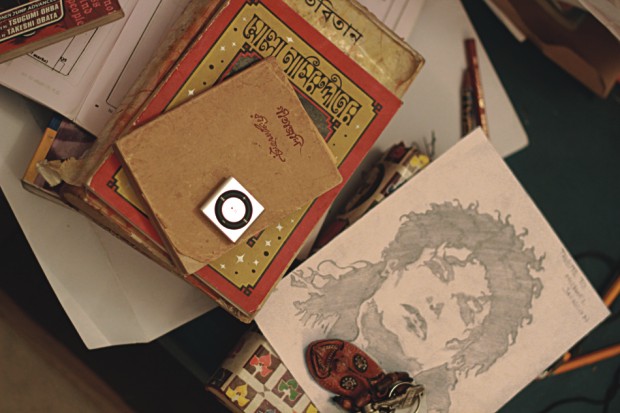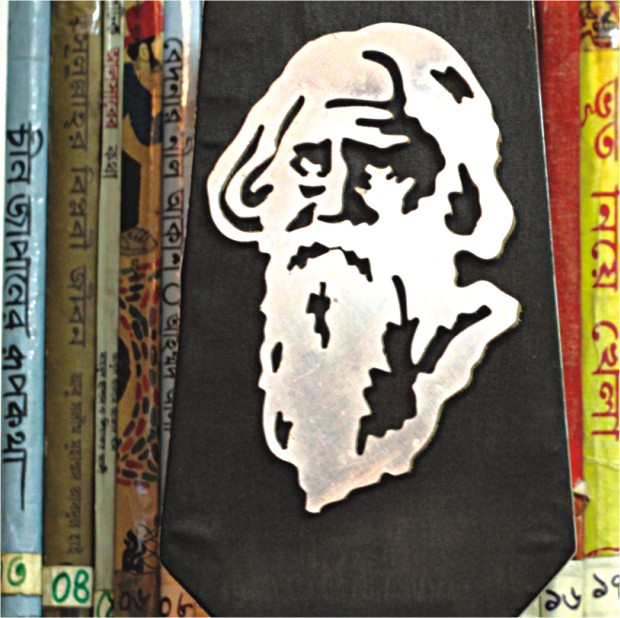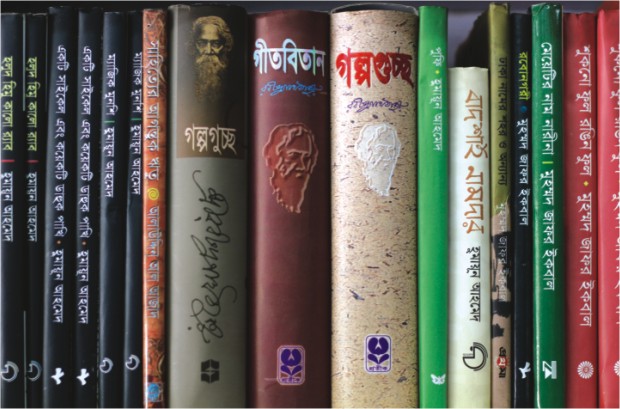| Spotlight

Appreciating Tagore Today
Elita Karim
Photo: Kazi Tahsin Agaz Apurbo
“Where the mind is without fear and the head is held high
Where knowledge is free
Where the world has not been broken up into fragments
By narrow domestic walls...”
- 'Where the Mind is Without Fear'
by Rabindranath Tagore.
One might just go back to the grade 7 or 8 English class and remember the English teacher, all animated and full of expressions while reading out to students Rabindranath Tagore's poem, 'Where The Mind is Without Fear.” Reminiscing back to the school days, one will remember being mesmerised by Tagore's words, his idea of gaining self respect through accumulating knowledge and building a world without barriers. Even though Tagore has always been acknowledged more for his Bengali poems, musical compositions and even Bengali plays, many of his translations and English works have also managed to inspire students, the academicians and his admirers.

Celebrating 150 years of Tagore's birth anniversary, one might think that his words
Celebrating 150 years of Tagore's birth anniversary, one might think that his words have probably ceased to inspire the youngsters and the students in Bangladesh. With Bengal giving birth to several more writers, thinkers, musicians and young prodigies after Tagore, can it be possible that the young ones today need no more of Tagore's antiquated verses and the spontaneous thoughts that he had poured out, during his time, on love, God, motherland and more? Not a chance! Even today there are thousands of young people in the country who appreciate the poet's work and try their best to learn about him and study his literature.

have probably ceased to inspire the youngsters and the students in Bangladesh.
Not only do young people today sing Tagore's songs and learn his compositions by heart, there are some who also like to read his stories and poetry for a peek into Bengal during his times and, of course, inspiration. 22-year-old Ratna Hawladar is a third year student at the Lalmatia Girls College in Dhaka. Also a student of the Nazrul Academy, practicing her voice for pitch and depth is one of her daily activities. “The first thing that I do after I wake up in the morning and get ready for college is practice for at least half an hour,” she says. “Because I am studying classical music, I emphasise on my standing notes a lot.” Like many others in the country, this young classical music enthusiast yearns to be a professional artist in the field of Hindustani classical music in the near future.

Young people read Tagore for fun.
One of her other pastimes, that she does almost every day, is reading Tagore's poetry. “I have always been a great admirer of Tagore's compositions and poems, both in Bangla and the ones in English as well,” adds Ratna. Despite the fact that the young singer likes Tagore's compositions, Ratna prefers to read the poems or recite them, and not sing them. “Of course, I can hold a tune even when it comes to Tagore songs!” Ratna lightly protests. “But I prefer reading his words or reciting them in my head. His words give me encouragement and also motivate me to move forward in my daily life. For instance, the song Jodi tor daak shune keu na aashe tobe ekla cholo re, is a very popular composition and most people would sing it. I am greatly motivated when I read the poem or recite it in my head. It tells me to move forward with my dreams and not look back.”
 |
Tagore songs: Always a part of the music playlists. |
Rabindranath Tagore has also become something of a brand amongst the younger people now -- flaunting his writings and also sketches of his portrait on their tee-shirts and fatuas. There are also many musicians today who try to showcase Tagore's compositions in their own ways with respect to the guidelines that were left by the poet himself. This is also one other reason as to why Tagore is 'in' amidst the younger crowd. “Why do you call him Tagore? I thought his name was Thakur!” exclaims Deepti Sharmin. A computer science student at North South University, this 19-year-old is quite the rebel and prefers not to think twice before expressing her thoughts and feelings to others. Clad in skinny jeans and an orange coloured fatua with sketches of, as she calls them -- “doodles and gibberish” -- on it, Deepti believes with all her heart that we can escape the post-British-imperialist phase that we all seem to be going through in this part of the world. All we have to do is appreciate what is ours and flaunt it to the rest of the world. “Rabindranath Thakur is a name we Bengalis should be proud of,” she says. “His writing, poems and compositions prove that he was like a sponge, absorbing everything he saw around him. It is a wonder how so much around him inspired him to think and write the way he did. Starting from the nature around him, boat rides in the middle of the river, relationships, religion, spirituality, to the fight against the British Raj, everything he wrote reflected the elements he felt at the time and witnessed around him.”
 |
Students study Tagore's literature for a better understanding of the language. |
Dr. Khaliquzzaman Elias, Professor at the English Department and Director of the Confucius Institute at the North South University, also a Tagore enthusiast, believes that the literature that Tagore had given us years ago is still going strong among the young generation. "There are tens of thousands of young, properly educated youngsters who love Tagore and sing his songs and read his literature," he says. However, he also adds that there are plenty of young people who are equally ignorant of Tagore's literature and his compositions and hence shows a lack of interest.
Speaking of his literature, there are students who study Tagore's essays, poems and other forms of literature even today, for a better understanding of the language, if not to study life in general. Mohammed Shamsuddin Rokon is a student of English studying at the Chittagong College. From a very young age, Rokon had always wanted to be fluent in the English language and hence, has been developing his reading, writing and conversation skills whenever and however possible. “English is an international language,” he explains. “If you are not fluent in English, you will practically be stuck and will not move forward in life. No matter what form of media you want to use be it new media, print, visual or audio a sufficient knowledge of English is very much necessary.” Also a part time translator, Rokon has translated several texts, for various companies, from Bangla to English and vice versa. For fun and practice, however, Rokon likes to translate verses and poems written by Tagore to English. “As you know, it is very difficult to translate something from one

Tagore's works are a part of contemporary reading, even today.
language to another,” he says. “You can translate actions and even theories sometimes. But it is a challenge when it comes to translating thoughts and feelings. Trying to translate Tagore gives me that challenge!” Rokon, at the moment is trying to translate Tagore's Nai nai bhoy, hobe hobe joy, khule jaabe ey dwar and plans to translate the complete Geetobitaan in the next few years.

Rabindro Sangeet is a part and parcen of today's music scene.
Through his literature, Tagore shares his opinions and views of the society that he had lived in, during his time. However, some of the stories that he shares through his work are still relevant today. For instance, in his poem, 'Where the Mind is Without Fear,' he talks about how people need to be honest, comprehend reason and be open to new ideas. Clearly, this would be the perfect message to the younger generation today. After all, it is them who can awaken the country from deep slumber. |
Copyright (R) thedailystar.net 2011 |

